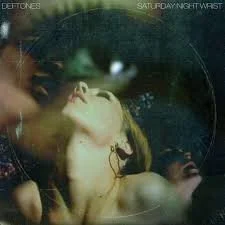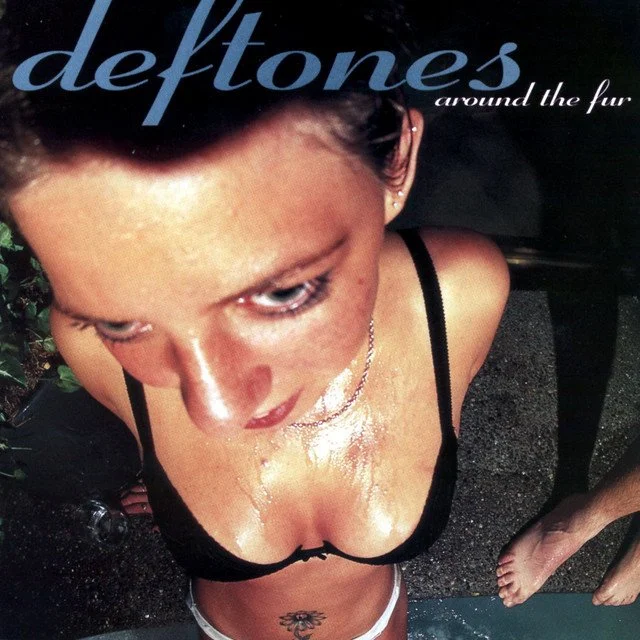Deftones: Ranking The Albums
Deftones are a pioneering alternative rock band from Sacramento, California, USA. Deftones have been called many things, including metal, nu metal and hard rock - but really, their music transcends labels. Chino Moreno’s unmistakeable vocals, Abe Cunningham’s tight, inventive beats, Stephen Carpenter’s chunky riffs and Frank Delgado’s wild atmospherics, all underpinned by rumbling bass from Chi Cheng (RIP) / Sergio Vega. Together, they make music unlike anyone else. Ranking every Deftones album is no easy feat, as they all have their merits. What you do you think? Check out the Spotify playlist and have your say in the comments below!
Deftones were on a roll after the triumphant one-two of ‘Diamond Eyes’ and ‘Koi No Yokan’, which had signalled something of a second phase of the band, not to mention a triumph over adversity.
It was a shame, therefore, when ‘Gore’ turned out to be so lacklustre. It starts well, with the dynamic, melodic ‘Prayers/Triangles’, which has all the hallmarks of classic Deftones - dreamy verses, punishing heaviness in the chorus, and cryptic lyrics. Unfortunately, from that point onwards it is hard to find moments that stick in the head or warrant repeated listens. The production doesn’t help either, with Abe Cunningham’s drums being overcompressed and less punchy than usual, and Chino’s voice spending much of the record shrouded in an uncomfortable distortion and / or reverb that detracts from the music.
‘Acid Hologram’, for all its inventive guitar textures, is a mid-paced grind. ‘Geometric Headdress’, ‘Pittura Infamante’, ‘Gore’ and ‘Rubicon’ are largely interchangeable, making it a challenge to survive the mid-section of the album without skipping.
Highlights are the delicate ‘Hearts/Wires’, with its languid shoegaze atmosphere, and the art-rock of ‘Xenon’, which breaks out triumphantly from claustrophobic verses into a surprisingly upbeat chorus.
There are seeds of good ideas throughout ‘Gore’, which are frustratingly underdeveloped, and interspersed with a lot of filler. A lot was made of Jerry Cantrell’s guest appearace on guitar in ‘Phantom Bride’, which says a lot because even this is quite unspectacular. There simply isn’t much to write home about here.
Standout Tracks: ‘Prayers/Triangles’, ‘Hearts/Fires’, ‘Xenon’
‘Saturday Night Wrist’ will, sadly, always be known as the last album to feature the original, classic Deftones line-up. It will also be known as the one that, like Foo Fighters’ ‘One By One’, was re-recorded because the band wasn’t happy with the original version.
Having worked with Terry Date on their first 4 albums, Deftones decided to try something new with the follow-up to 2003’s self-titled record. They enlisted the help of Bob Ezrin, an acclaimed producer whose discography incldued Pink Floyd’s 1979 masterpiece ‘The Wall’, as well as several Alice Cooper and Kiss records. He wasn’t exactly an obvious choice for Deftones, so this was a bold - and typically ambitious - move.
One thing that is immediately obvious is that Terry Date’s iconic, crisp drum sound has disappeared. The overall sound is thick, heavy and immersive, but devoid of the ‘classic’ Deftones sound - and perhaps this was the point. It may feel more like an interlude, but ‘U,U,D,D,L,R,L,R,A,B,Select,Start’ is a good case in point, sounding more like the post-rock of Mogwai, My Bloody Valentine or Godspeed, You Black Emperor than the Deftones we had grown to love through ‘Around The Fur’ and ‘White Pony’.
‘Saturday Night Wrist’ actually works best when it doesn’t sound like quintessential Deftones. ‘Xerces’, for example, uses the new production to great effect, as does the magnificent, triumphant ‘Cherry Waves’. Where things fall down, unfortunately, is in the heavier songs (such as ‘Rapture’, ‘Combat’ and ‘Rats!Rats!Rats!’), where the performances sound somewhat ponderous and forced, and the highlights are the small, brief moments such as the robotic vocals in the chorus of ‘Kimdracula’, rather than the songs themeselves.
Overall, ‘Saturday Night Wrist’ rewards multiple listens and is an artistic achievement, but it doesn’t have the level of consistent quality that can be found elsewhere, particularly compared with ‘Koi No Yokan’, ‘Diamond Eyes’, ‘White Phony’ and ‘Around The Fur’.
Standout Tracks: ‘Hole in the Earth’, ‘Xerces’, ‘Cherry Waves’
It may have been a mere stop-gap between albums, at the insistence of the record label, but ‘B-sides and Rarities’ is a decent listen that gives some fascinating insight into Deftones’ influences. It doesn’t flow in the same way that proper studio albums do, but as a compilation it works very well, especially if you include the excellent low-fi cover of ‘Drive’ (originally by The Cars) which wasn’t on the original ‘B-Sides and Rarities’ but appears on some streaming services.
Deftones have always been vocal about their range of influences, most of which are far removed from the heavier sound that Deftones have cultivated themselves. Duran Duran, for example - not exactly a ‘heavy’ band. And yet, ‘The Chauffeur’ actually has more brooding darkness than Duran Duran’s mainstream hits would suggest. Deftones exploit this darkness, turning ‘The Chauffeur’ into track that could have fitted onto ‘White Pony’. Similarly, ‘No Ordinary Love’ suits Chino’s voice perfectly. ‘Savory’ sounds like a Deftones song, as does ‘Sinatra’.
We are also treated to an epic cover of The Cure’s ‘If Only Tonight We Could Sleep’, the live performance of which has been met with Robert Smith’s approval. Elsewhere, the album is padded out with acoustic versions of Deftones’ own ‘Change (In The House of Flies)’, ‘Digital Bath’ and ‘Be Quiet and Drive (Far Away)’ (the latter of which now sounds like Massive Attack) which underline just how good the originals are. A very intriguing listen.
Standout tracks: ‘Please Please Please Let Me Get What I Want’, ‘Savory’, ‘The Chauffeur’
With ‘White Pony’, Deftones showed that they could take their music in any direction they wanted. Trip hop? Sure. Prog metal? Absolutely. Industrial? Of course.
It was curious, therefore, that they chose to go heavier and darker on the follow-up. Simply titled ‘Deftones’, this album oozes menace. There are a couple of lighter moments - ‘Lucky You’ (a less inspired retread of ‘Teenager’), and ‘Anniversary of an Uninteresting Event’ (a stunning, glacial-paced tearjerker) - but otherwise, ‘Deftones’ is a more singular, blunt attack.
The heaviness was turned up to 11 on ‘When Girls Telephone Boys’ and ‘Hexagram’, with Chino’s throat-lacerating vocals seemingly influenced by Glassjaw and some of the early 00s screamo scene which Deftones had inadvertently helped to create. It is brilliant at times, especially on the alternating loud-quiet dynamics of ‘Needles and Pins’ and the dreamy, magnificent ‘Minerva’, which is easily one of Deftones’ best-ever songs.
There is a nagging feeling with this record that Deftones could have pushed themselves further to produce something that took ‘White Pony’ another step further. Instead, ‘Deftones’ is a slight step backwards, albeit still a decent album overall.
Standout tracks: ‘Minerva’, ‘Anniversary of an Uninteresting Event’, ‘Needles and Pins’
Returning from a 4-year gap after the disappointing ‘Gore’, Deftones unleashed ‘Ohms’ in September 2020, when the world was in turmoil. The first single to be released was album opener ‘Genesis’, which initially sounded like a retread of ‘Gore’, with its mid-tempo grind, unneccessary distortion on Chino’s voice, and unspectacular melody. However, ‘Genesis’, like previous openers ‘Feiticeira’ and ‘Hexagram’, is a grower. It certainly isn’t the best track on ‘Ohms’ but it plays a decent role of setting the tone for the album.
‘Ohms’ actually gets better as the album goes on, and the final 4 tracks (‘This Link is Dead’, ‘Radiant City’, ‘Headless’ and ‘Ohms’) are the most enjoyable. It almost feels like the songs were recorded in the order they appear on the record, and Deftones grew in confidence the further they got into the set. The closing title track has the most memorable melody and leaves the most impact.
Elsewhere, there is a wonderful interplay between the rhythmic chugging guitar and drums in ‘Urantia’, and ‘Pompeji’ flirts with the dripping atmospherics of ‘Koi No Yokan’ in its verses, before Chino lets rip with a Maynard-esque “Jesus Christ, God raises you as we raised our glasses and drank in hell”. Overall, ‘Ohms’ is somewhat one-dimensional, but a much more engaging experience than its predecessor ‘Gore’.
Standout tracks: ‘Ohms’, ‘Radiant City’, ‘Urantia’
There is something genuinely threatening and ominous about the quieter moments on ‘Adrenaline’. Take the verses of ‘Minus Blindfold’, for example. The eerie guitar tone sounds like it is going to explode at any moment, underpinned by a deep, rumbling bass, propulsive drums and Chino’s unmistakeable half-whispered, half-song vocals. Then the HEAVINESS kicks in.
‘Adrenaline’ feels dangerous. Bear in mind that it came out in 1995, the post-Nirvana world when there was an exciting climate for established bands like Fear Factory, Rage Against The Machine, Sepultura and Helmet, joined by the pioneering debut from Korn in 1994. Nu Metal wasn’t a ‘thing’ yet (Limp Bizkit’s debut album ‘Three Dollar Bill, Y’all’ didn’t come out until 1997), but the seeds had been sown. Deftones had one foot in that camp, but they also brought something fresh and different right from the start. A skewed, original sense of melody. Unconventional vocals. Tight, groovy drums. A unique, cutting guitar tone.
Deftones’ debut was raw and relatively one-dimensional compared to the albums that came later, but its sonic directness is its main strength. The opening riffs to ‘Root’ and ‘Bored’ remain truly iconic, nearly 30 years on, and the anticipation for the nasty chorus and the “Squeal like a pig” section of ‘7 Words’ is thrilling.
Standout tracks: ‘Root’, ‘Minus Blindfold’, ‘Engine No. 9’
After the relatively subdued ‘Saturday Night Wrist’ and the tragic loss of charismatic bassist Chi Cheng, who was in a coma following a motorbike accident, the fact that ‘Diamond Eyes’ exists at all is something that no Deftones fan takes for granted. The fact that it is one of their best albums is even more impressive.
Deftones are known for taking their time when making albums. After Chi Cheng’s accident, they abandoned the Terry Date-produced ‘Eros’ record which had been nearing completion (the only known song from these sessions is the wonderful ‘Smile’ that eventually came out in 2014). Following a period of reflection, Deftones regrouped with new bassist Sergio Vega, writing and recording ‘Diamond Eyes’ in just 2 months, with a different producer Nick Raskulinecz, who had previously worked with Foo Fighters, Alice in Chains and Stone Sour.
‘Diamond Eyes’ is a rarity for Deftones, in that it sounds like they had fun in the studio. Rather than giving into the temptation to lament the absence of Chi Cheng with morose or angry songs, most of ‘Diamond Eyes’ is imbued with a sense of optimism - from the chorus of the opening title track, to the playful djent-y chug of ‘You’ve Seen The Butcher’, to the wildly violent screams of “Guns! Razors! Knives!” in ‘Rocket Skates’.
There are plenty of slower soundscapes, such as ‘Sextape’ and ‘This Place Is Death’, but they are compact and concise. In fact, at 41 minutes, ‘Diamond Eyes’ is Deftones’ shortest album by some margin - and it is all the better for it. Lean, direct and full of memorable moments.
Standout tracks: ‘Diamond Eyes’, ‘Beauty School’, ‘Rocket Skates’
“Koi No Yokan’ is a superb, engrossing record, with a similar spirit to the equally impressive ‘Diamond Eyes’, but with an extra depth in all areas, sonically, melodically and lyrically. The cover fits the music perfectly - an abstract picture of what seems to be a doorway, a room of mirrors, or perhaps the lights of a high-rise Tokyo city building.
‘Koi No Yokan’ is a Japanese term that doesn’t have a direct English translation, but loosely means meeting someone for the first time and knowing instinctively that there is a connection between you. Chino Moreno’s lyrics are cryptic as ever, but there is a sense of longing and the beauty of romance throughout the record (especially in the fantastic second track ‘Romantic Dreams’ - “I'm hypnotized by your name, I wish this night would never end”) that is truly enchanting.
Steph Carpenter’s love of 7-string guitars is apparent in the gloriously chunky and inventive riffs of ‘Poltergeist’ and ‘Graphic Nature’. But the real higlight, in an album full of them, is ‘Entombed’, which is perhaps the closest that Deftones can get to making a power ballad. It is majestic, multi-layered and huge.
‘Around The Fur’ is to be enjoyed by huge crowds, during a daytime festival. By contrast, ‘Koi No Yokan’ feels like an album that should be experienced by candlelight.
Standout tracks: ‘Romantic Dreams’, ‘Entombed’, ‘Tempest’
In truth, the albums ranked 1st and 2nd in this list could both be argued to be the ‘best’ Deftones album. ‘Around the Fur’, Deftones’ second record, leans heavily into the aggressive and raw energy of 90s alternative metal, showcasing intense guitar riffs, dynamic drumming, and Chino Moreno's signature vocal range oscillating between screams and melodic passages. ‘White Pony’ trumps it for variety and sonic depth, but ‘Around The Fur’ is still incredible.
From the opening 2 drum hits of ‘My Own Summer (Shove It)’, ‘Around The Fur’ is instantly recognisable. Terry Date’s production is crisp and clear, and this song remains one of Deftones’ finest, accompanied by an awesome video in shark-infested waters. It was immediately obvious that they had stepped up from ‘Adrenaline’, both in terms of songwriting and also confidence in their own abilities.
We then move on to ‘Lhabia’, with a relentless guitar chug that holds a controlled, steady pace when most other bands would give into the temptation to speed up. This is quintessential Deftones - coming up with something that other bands simply wouldn’t be brave enough to do.
Highlights through the album are plentiful, from the iconic drum intro to the title track, to Max Cavalera’s brutal screams of “Soulfly!” in the chunky ‘Headup’ (in fact, the band name Soulfly came from this guest appearance), to the utterly ferocious ‘Lotion’. Deftones had already built a reputation as a visceral live band, and ‘Lotion’ took what they had started with ‘7 Words’ and ‘Root’ and ramped up the heaviness to 11, channelling the brutality of fellow Californians Will Haven who released their inspriational ‘El Diablo’ in the same year.
Oh, and ‘White Pony’ also has ‘Be Quiet and Drive (Far Away)’, a timeless classic which showed a maistream accessibility while still being effortlessly cool.
Standout Tracks: ‘Loton’, ‘Rickets’, ‘My Own Summer (Shove It)’
“Third album syndrome” is a real thing.
So often, bands can find it a struggle to maintain the freshness and energy of their early years, while also avoiding getting stuck repeating the same formula. With this in mind, ‘White Pony’ is a strong contender for ‘Best 3rd Album Ever’ across any genre.
The vibrant, heavy riffs from the first 2 records make their way into ‘Street Carp’, ‘Korea’ and ‘Elite’, while other parts of ‘White Pony’ step into genuinely new, inventive territory.
It’s hard to pin down exactly what makes ‘White Pony’ so good. Maybe it’s the consistent quality throughout, or the impeccable production (with a greater influence from Frank Delgado).
Maybe it is the range of atmospheric textures (‘Passenger’ is a fantastic example, with beautiful vocal interplay between Chino and guest vocalist Maynard James Keenan, in full A Perfect Circle mode); or quite simply the unusual, unorthodox songwriting.
Whatever it is, ‘White Pony’ is special. It’s an album you can immerse yourself in. A complete sonic experience like no other.
(Just don’t include ‘Back to School’ in the tracklisting - that song is best forgotten).
Standout tracks: ‘Digital Bath’, ‘Teenager’, ‘Passenger’










